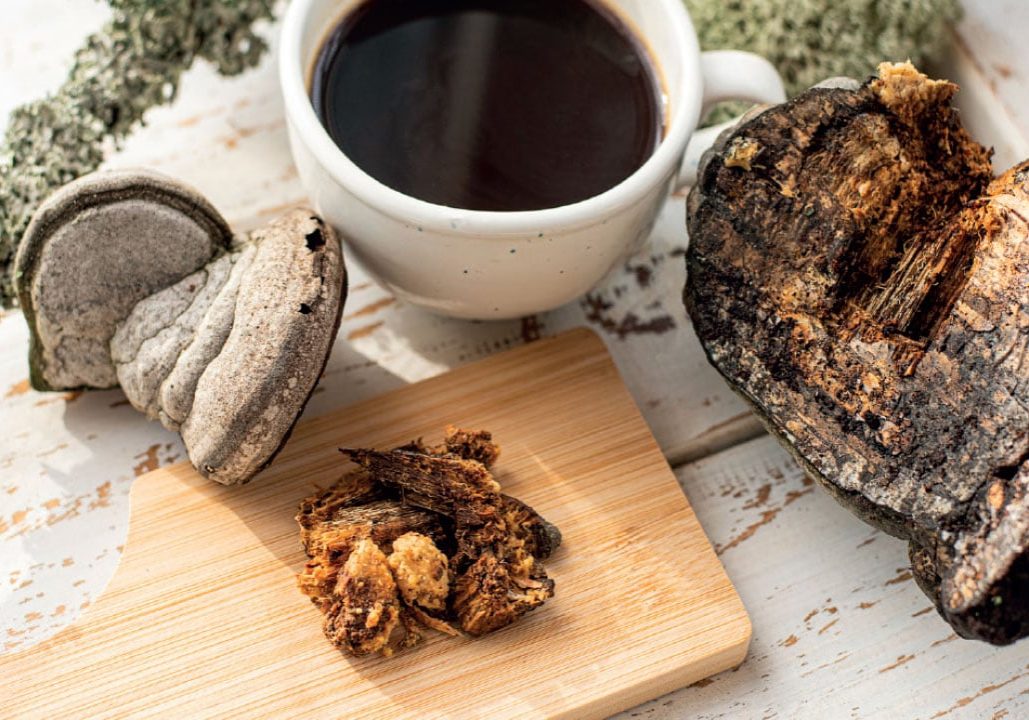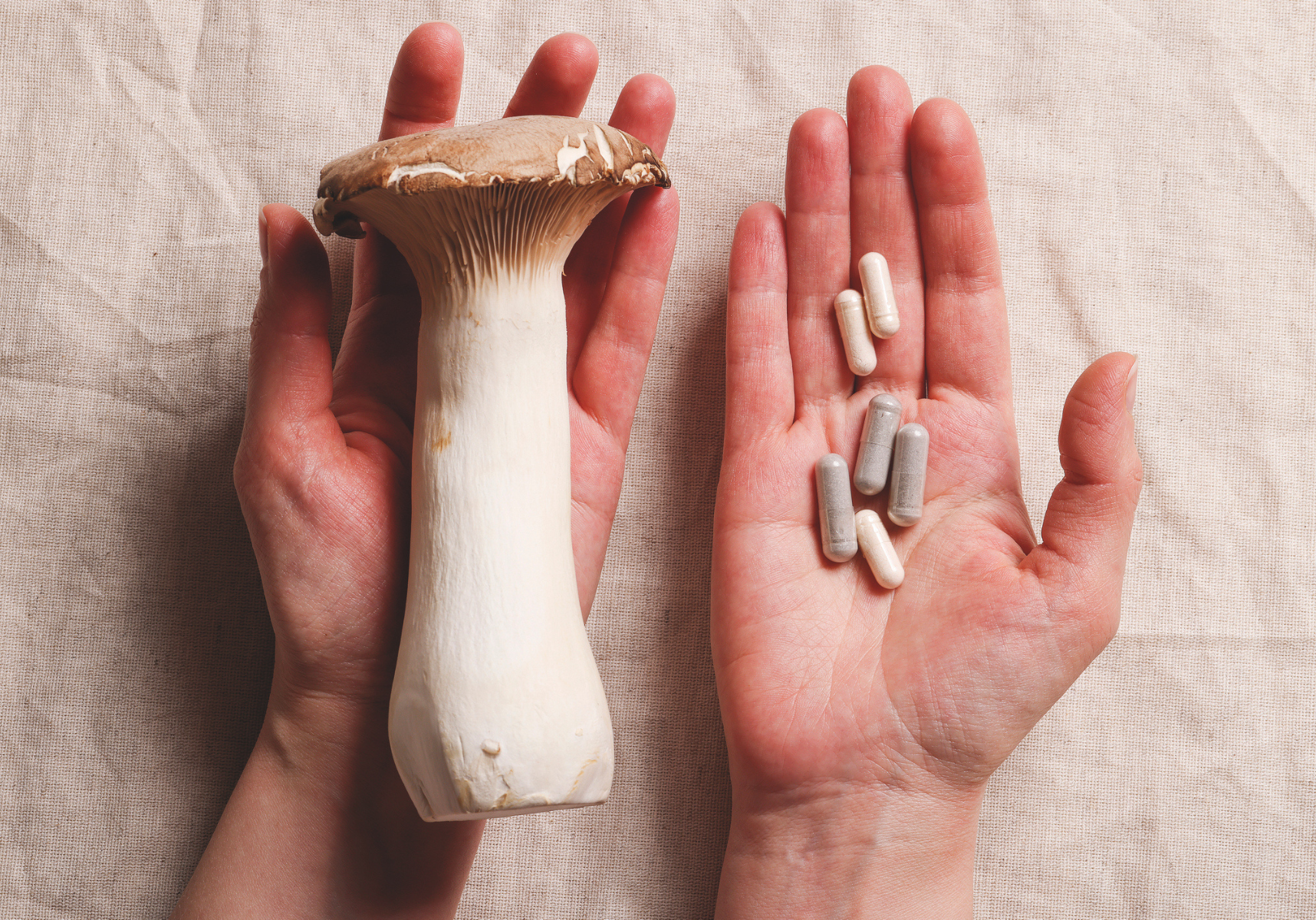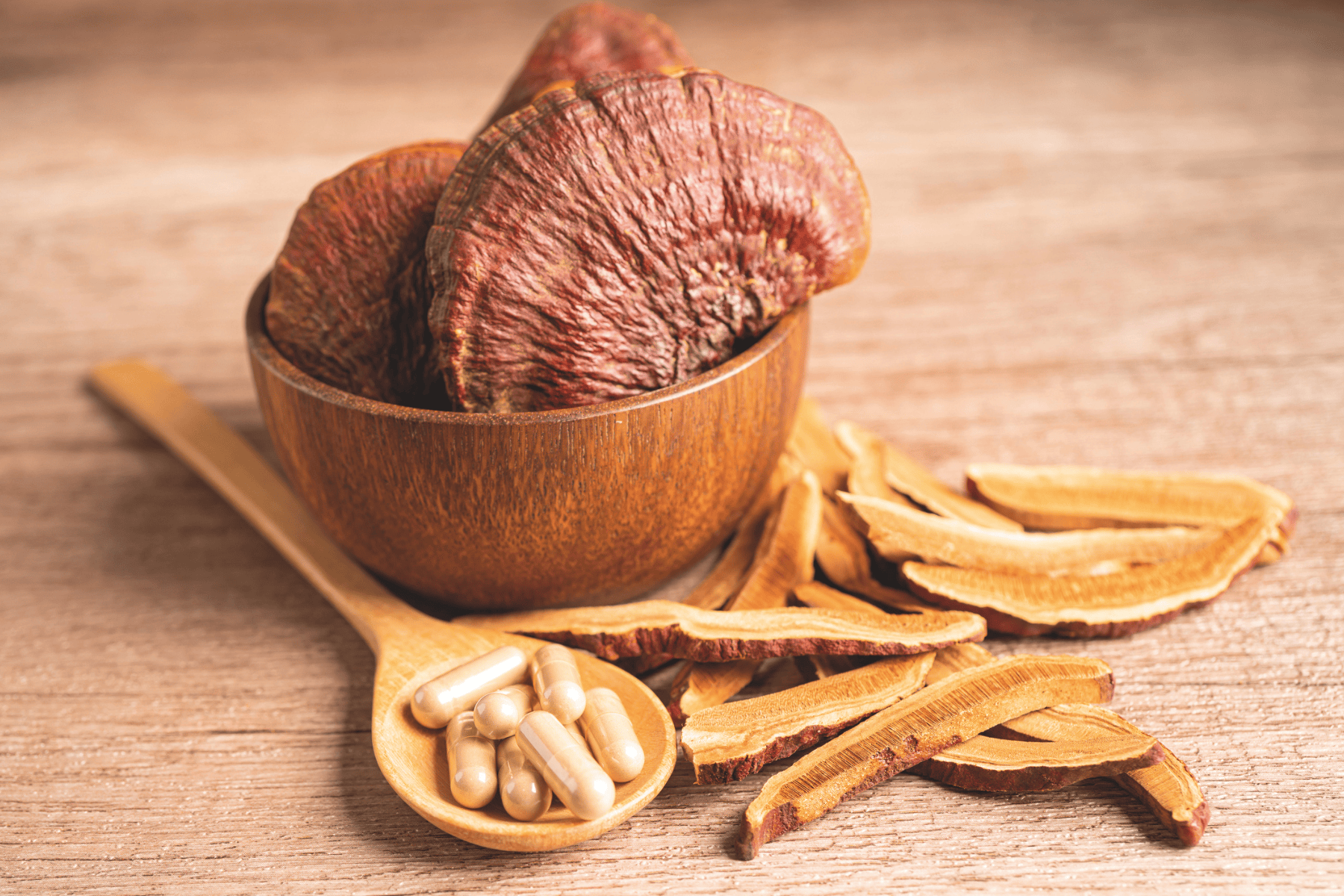
6 medicinal mushrooms to elevate your yoga
Six medicinal mushrooms that could enhance your yoga practice and wellness lifestyle. By Kate Schenk
Reading time: 4-5 minutes
Medicinal mushrooms have a long-standing reputation in the wellness industry for their potential to support immune health, mental clarity and resilience. In recent years, they have become increasingly popular in the yoga community as tools to enhance physical, mental and spiritual aspects of the practice.
Many yoga practitioners and teachers are choosing to explore medicinal mushrooms to improve focus, increase endurance and aid in recovery. This synergy between yoga and medicinal mushrooms highlights a holistic approach to wellbeing that incorporates both physical, mental and spiritual health.
Here we take a look at six medicinal mushrooms and their potential in supporting a yogi at any level.
1. Reishi (Ganoderma Lucidum): The Calming Ally
Often referred to as the ‘Mushroom of Immortality’, reishi is valued for its adaptogenic properties, helping the body cope with stress, balance mood and support immune function. Reishi’s calming effects are ideal for yoga practitioners looking to cultivate a sense of peace, reduce stress and deepen meditation practices.
How Reishi Supports Yoga Practice:
Reishi’s ability to support the nervous system makes it an excellent complement to slower, more meditative styles of yoga, such as yin, hatha and restorative yoga. Taking reishi before or after practice may encourage a calmer mind, smoother breathwork and greater emotional stability. This calm is beneficial not only during practice but also for long-term stress management, allowing practitioners to bring their yoga’s peaceful mindset into everyday life.
2. Lion's Mane (Hericium Erinaceus): The Cognitive Enhancer
Lion’s Mane is well-regarded for its cognitive benefits. Known to support focus, mental clarity and nerve health, it promotes the synthesis of nerve growth factor (NGF), which is essential for brain health and neuroplasticity. In yoga, where awareness and focus are key, Lion’s Mane can help practitioners stay present, mindful and connected with their movements and breath.
How Lion's Mane Supports Yoga Practice:
For yoga styles that demand concentration and mental clarity, such as vinyasa or kundalini, Lion’s Mane is an excellent companion. The mushroom’s focus-enhancing effects help practitioners maintain mental steadiness during sequences and aid in meditation. For teachers, it can support clear thinking and memory recall, improving instructional quality and sequencing.
3. Cordyceps (Cordyceps Sinensis): The Energy Booster
Cordyceps is renowned for its potential to enhance stamina, oxygen utilisation and overall energy levels. In ancient practices, it was traditionally used to improve endurance and athletic performance, making it ideal for physical exertion. Its energising effects are perfect for yoga styles that require strength, resilience and endurance, like ashtanga, power yoga or dynamic vinyasa flows.
How Cordyceps Supports Yoga Practice:
Cordyceps can boost stamina and lung capacity, which can help practitioners maintain energy during rigorous flows or extended poses. It also aids in muscle recovery, an essential benefit for daily practitioners. By supporting oxygen intake, Cordyceps may help sustain practitioners through intense or prolonged sessions, reducing fatigue and supporting recovery.


4. Chaga (Inonotus Obliquus): The Immune Modulator
Chaga is known for its rich antioxidant content and immune-modulating properties, making it a powerful addition for overall wellness. With its grounding and detoxifying qualities, Chaga is ideal for yoga practitioners who are focused on holistic health, grounding and internal balance.
How Turkey Tail Supports Yoga Practice:
For practitioners who follow a regular yoga routine, especially in environments where seasonal changes or shared spaces might impact health, Chaga can help bolster the immune system. Its grounding energy aligns well with practices that emphasise stability and centering, like hatha or grounding meditations. Additionally, its anti-inflammatory benefits can aid in muscle recovery and reduce soreness from challenging poses.
5. Turkey Tail (Trametes Versicolor): The Gut-Immune Link
Turkey Tail is widely studied for its immune-supportive properties, thanks to polysaccharides like PSK and PSP. It is also beneficial for gut health, which has a significant impact on immunity, mood and energy levels. With its gentle but potent support, Turkey Tail is an excellent choice for yoga practitioners looking to boost their overall health.
How Chaga Supports Yoga Practice:
Yoga and gut health are closely linked, as a balanced gut can improve mood, energy and resilience. Turkey Tail’s immune benefits are especially useful for those practicing yoga in community settings, where maintaining immune health is important. By fostering a healthy microbiome, Turkey Tail can support digestive wellness, which, in turn, enhances physical and mental vitality during yoga practice.
6. Maitake (Grifola Frondosa): The Balancing Mushroom
Maitake, also called ‘Hen of the Woods’, is celebrated for its immune[1]supportive and adaptogenic qualities. It is thought to help regulate blood sugar and support cardiovascular health, making it a solid choice for practitioners focused on balancing physical health with spiritual wellbeing.
How Maitake Supports Yoga Practice:
Maitake’s balancing qualities make it a wonderful addition for practices that emphasise harmony and stability, such as hatha and yin yoga. Its grounding nature aids in creating a balanced state that supports both physical health and inner peace, aligning well with yogic values of balance and moderation.
Integrating Medicinal Mushrooms into Yoga Practice
By bringing medicinal mushrooms into a wellness routine, yoga practitioners can amplify their physical resilience, mental clarity, and emotional balance, creating a harmonious blend of physical and spiritual wellness that aligns with yogic principles of holistic health. Practitioners might take the mushrooms like Cordyceps or Lion’s Mane before practice to enhance energy and focus, while Reishi or Chaga can be taken afterward for relaxation and recovery. There are numerous ways in which medicinal mushrooms can be incorporated into yoga practice with a wide variety of tinctures, teas and powders available on the market.
Kate Schenk and her partner Matty, based in Shropshire, founded Mamas Cottage Mushrooms in 2021. The business quickly took off as they began sharing their creations at their local market. Initially focused on simple tinctures, they expanded to offering spagyric elixirs — advanced alchemical preparations designed to capture the full spectrum of the mushrooms and herbal properties. Visit: mamascottagemushrooms.com or connect on IG at @mamascottagemushrooms3


